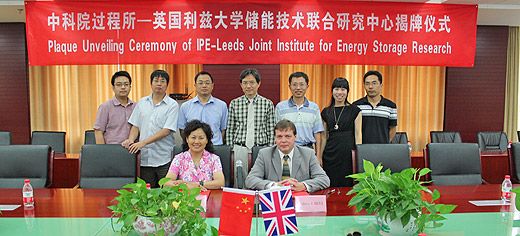
The University of Leeds and the Chinese Academy of Sciences have teamed up to create a joint research institute to develop next generation energy storage systems.
Finding more effective and efficient ways to store energy is becoming increasingly important to deal with the problem of peak demand on electricity grids. The ability to store excess energy generated from wind or solar generation is also a pressing problem.
People use a wide variety of technologies to store energy, for example batteries, pumped hydro power plants and compressed air energy storage systems. But these all have several drawbacks. Batteries often are expensive and have a short life-span. Pumped storage plants, such as Dinorwic in North Wales, UK, pump water uphill into a reservoir or lake. They later release the water downhill to drive turbines when electricity demand is high. But these systems are very expensive and require special geological sites, as do compressed air systems.
The new institute will focus on thermal and mechanical based energy storage technologies which promise to overcome many of these problems. Thermal energy accounts for about 90% global spending on energy; it makes sense to find ways to store energy in the same form as which you want to use it. Nearly 50 researchers will work on research projects with an overall budget of £4 million. The projects will develop and test new materials and processes for energy storage and explore methods for transferring and using energy more efficiently in both domestic setting and industry.
The joint research institute is a collaboration between the Institute of Particle Science & Engineering at the University of Leeds and the Institute of Process Engineering (IPE) of the Chinese Academy of Sciences (CAS). The two partners have worked together on projects for many years (see Energy storage system deals with sudden draws on the grid), but this is the first time they have agreed to coordinate and combine their resources.
Leeds has expert researchers in nanostructured energy storage materials, thermal and mechanical based energy storage technologies, and heat transfer fluids. IPE will make it easier to get new commercial solutions to market with its experience in integrating energy storage technologies with renewables and industrial processes, and its knowledge on how to scale-up processes and pilot prototype systems.
Speaking at the formal opening of the Institute in Beijing, on 25 July 2012, Professor Andrew Bell from the University of Leeds, said: “Over the years we have developed highly successful collaborations with our colleagues at the Chinese Academy of Sciences. The University of Leeds is delighted to combine our areas of research expertise through this joint institute which will create a highly competitive platform for effective and substantial collaborations in advanced energy storage science and engineering.”
According to University of Leeds’ Professor Yulong Ding, the first director of the joint research institute, the initiative will help researchers to access funding opportunities in China, the UK, EU and other international sources.
“This is an exciting and long-term opportunity which will help to secure our research into novel energy storage technologies over both the medium and long term. We aim to recruit high quality postgraduate students, produce joint publications and joint intellectual property and drive knowledge transfer. We have already demonstrated that a collaborating platform is crucial to attract funding from UK, Chinese and multi-national companies and, once funding is obtained, to run the projects subsequently in an easier and effective manner,” he said.
“The joint research combines the strengths of the two technically complementary organisations, which will promote the fast transfer of knowledge in the energy storage area and drive new technologies out of the lab and into the market,” said Professor Suojiang Zhang, Director of Institute of Process Engineering, Chinese Academy of Sciences.
One of the first activities of the joint institute will be to set up a scheme which will allow PhD students in the Institute to move between Leeds and Beijing. This exchange programme will allow the students to spend time in the different labs to progress their research and benefit from the expertise and facilities of the two partner organisations.
The joint research institute has some over 45 researchers working on over 20 projects funded by the UK’s Engineering and Physical Sciences Research Council, the Chinese Academy of Sciences, China Natural Science Foundation, the Chinese Ministry of Science & Technology, Highview Power Storage Ltd (UK), BaoSteel (China) and AnSteel (China).
Further information:
Professors Yulong Ding (Y.Ding@leeds.ac.uk) and Andy Bell (A.J.Bell@leeds.ac.uk) are available for interview.
Please contact the University of Leeds Press Office on +44 (0)113 343 4031 or email pressoffice@leeds.ac.uk
The Institute of Particle Science & Engineering (IPSE) at the University of Leeds is a centre of excellence helping to improve quality of life by addressing the engineering science of particulate processes and products. Its current activities centre around nanoparticles for applications in energy and environment, advanced materials, healthcare and biotechnologies.
The Institute of Process Engineering (IPE) of the Chinese Academy of Sciences (CAS) is the most reputed centre of excellence in particle science and engineering research in China. It is located in the high tech region of Zhong Guan Chun in Beijing’s nortwest Haidian high-tech district. IPE houses the State Key Laboratories of Multiphase and Complex Systems, State Key Laboratory for Biochemical Engineering, National Biochemical Engineering Research Institute (Beijing), National Laboratory for Clean Hydrometallurgical Production and Key Green Chemical Process Laboratory of CAS. IPE is also home to the Chinese Society of Particuology which boasts thousands of members from across academia and industry. http://www.ipe.cas.ac.cn/